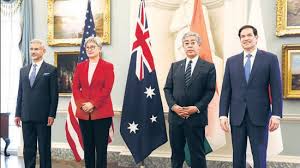We expect Quad to understand our position on terror: Jaishankar

Jaishankar Calls on Quad to Align with India’s Counterterrorism Priorities
India urges stronger global action on terrorism through Quad partnership
External Affairs Minister Dr. S. Jaishankar has urged the Quad nations — India, the United States, Japan, and Australia — to support India’s clear and firm stand on terrorism. His strong statement highlights New Delhi’s expectation for coordinated global efforts against cross-border terror threats. These threats continue to undermine peace and stability in South Asia and the Indo-Pacific.
During a recent press interaction, Jaishankar stressed that terrorism is one of the world’s most serious challenges. He reminded global partners that India has always led the way in fighting terror. He also emphasized that India expects its closest allies, especially within the Quad, to show full support on this matter.
India’s Message to Its Strategic Partners
“We expect the Quad to understand our position on terrorism clearly,” said Jaishankar. “This issue is central to our security, our sovereignty, and our future. For India, counterterrorism is not just policy — it’s survival.”
He noted that some countries still treat terrorism as a bilateral issue. However, India wants the global community to adopt a zero-tolerance approach. According to Jaishankar, terrorism can never be justified, regardless of the reason.
Indo-Pacific Not Immune to Terror
The Quad, or Quadrilateral Security Dialogue, has evolved into a strong strategic partnership. Once informal, it now focuses on defense, infrastructure, digital security, and more. Although counterterrorism hasn’t always led the agenda, its importance is rising quickly.
Jaishankar pointed out that terror networks now operate across borders, often without detection. “These threats move fast — through online platforms, dark money, and sometimes under political cover. We cannot ignore them,” he said.
India’s location puts it at the center of these dangers. Jaishankar said the country’s experiences are based on harsh realities, not theory. “We expect Quad partners to value that experience and work with us to build effective solutions,” he added.
India’s Long Fight Against Terror
India has faced many deadly terror attacks over the years. From the 2001 Parliament attack to the 2008 Mumbai siege, and recent incidents in Jammu and Kashmir, the threat remains constant.
New Delhi continues to blame neighboring Pakistan for giving safe haven to terrorist groups. These groups, India says, operate across borders and have cost countless lives. Though global attention has increased, decisive action has often been slow.
India has long called for a global treaty on terrorism — the Comprehensive Convention on International Terrorism (CCIT). But progress has stalled. Jaishankar’s remarks reflect India’s growing frustration and desire for stronger backing from allies like the Quad.
Quad Must Prioritize Counterterrorism
The Quad’s current focus includes vaccine cooperation, critical technologies, maritime security, and supply chains. But India wants counterterrorism to take a top spot.
Jaishankar’s message is clear: the fight against terrorism cannot be a side issue. Some experts believe his words are not just a reminder but a warning. India is looking for more than talk — it wants real collaboration.
This includes sharing intelligence, conducting joint drills, and sending strong messages against states that support terrorism. “We need unity in action, not just agreement in principle,” Jaishankar stressed.
Global Shifts Demand Bold Action
The global political scene is changing fast. Tensions between major powers, conflicts in the Middle East, and competition in the Indo-Pacific have reshaped alliances. The Quad is now seen as a key force for democracy and security.
Jaishankar’s appeal also aligns with India’s rising global role. As a leader in platforms like the G20, India expects its concerns to be heard. “If the world sees India as a global leader, it must also respect our security needs,” he said.
What Comes Next?
Many analysts agree that the Quad needs a clear, organized counterterrorism plan. This could include a working group on terrorism, regular security meetings, and joint action against listed terror groups.
There is also growing support for naming and isolating states that back terrorism. Such bold moves would show global resolve and send a strong message to those who threaten peace.
India continues to push for a strong global stance against terrorism. As Quad cooperation deepens, the coming months will reveal whether India’s expectations will lead to real action.






